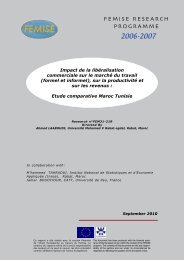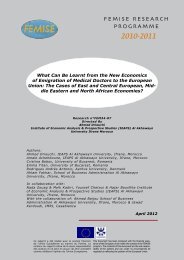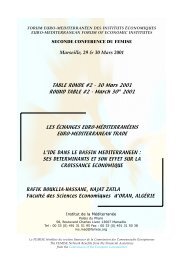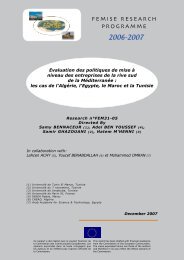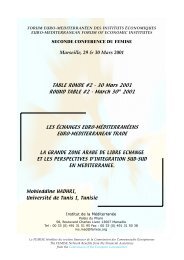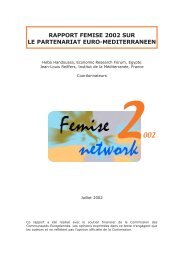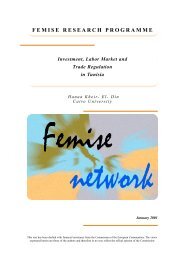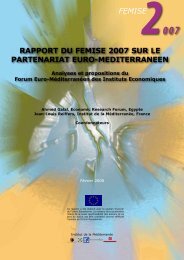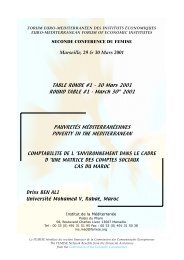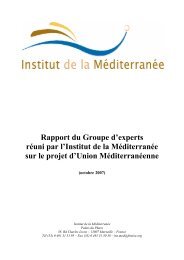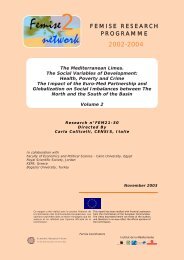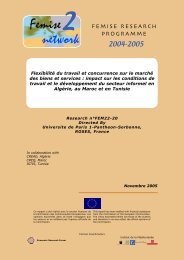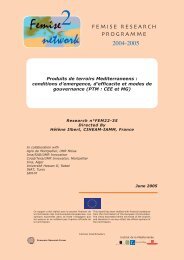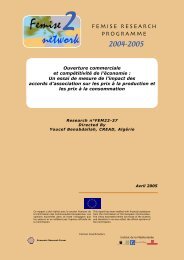PDF, GB, 56 p., 1,3 Mo - Femise
PDF, GB, 56 p., 1,3 Mo - Femise
PDF, GB, 56 p., 1,3 Mo - Femise
You also want an ePaper? Increase the reach of your titles
YUMPU automatically turns print PDFs into web optimized ePapers that Google loves.
to identify whether ROOs are indeed impacting upon trade flows. The formal<br />
empirical literature is also supplemented by a plethora of anecdotal evidence and case<br />
studies. It is also well known that these rules are frequently a contentious issue in<br />
PTA negotiations - and indeed this was the case with regard to the Agadir Agreement.<br />
The strong picture which emerges from this literature is that ROOs do appear to be<br />
significantly impacting upon patterns of production and on trade flows. In particular<br />
ROOs tend to increase trade between PTA partner countries at the expense of trade<br />
between the PTA countries and third countries. In the context of the EU-Southern<br />
Mediterranean partnership ROOs are likely to impact negatively on South-South<br />
Mediterranean trade at the expense of (hub-and-spoke) EU-Southern Med trade.<br />
It is important to point out that the formal empirical literature tends to focus on the<br />
impact of ROOs on aggregate trade flows, and the more informal literature tends to<br />
focus on specific industries and/or countries. There is very little work then on<br />
identifying the potential restrictiveness of ROOs across a range of sectors, nor on the<br />
underlying explanatory factors for the restrictiveness.<br />
The aim of this research is therefore to focus on the change in cumulation<br />
arrangements which occurred in 1996 to directly identify and differentiate between<br />
the restrictiveness of rules of origin across a range of sectors, secondly to analyse the<br />
determinants of the restrictiveness of rules of origin, and thirdly to assess the validity<br />
of the formal empirical results with reference to the case study of Egypt<br />
This part of the report is divided into three principal sections. The first section<br />
provides a conceptual discussion of the importance of rules of origin, and of the role<br />
and importance of cumulation provisions in regional trade agreements. This<br />
discussion draws heavily on earlier work by Augier, Gasiorek and Lai-Tong<br />
(Economic Policy, 2005). In that earlier work we identified the potential importance<br />
of the cumulation of rules of origin on trade flows in the context of the EU’s Pan-<br />
European Rules of Origin for total trade, intermediate trade and manufacturing trade.<br />
However, to the extent that rules of origin impact upon trade flows, one would expect<br />
that impact to differ across sectors. Hence, in the second section of this report we<br />
provide new estimates of the potential impact of cumulation, but this time at the<br />
sectoral level. The third part of this section of the report considers what are the<br />
principal explanatory variables which help in identifying the circumstances under<br />
which rules of origin are more likely to be constraining.<br />
2. Conceptual Background<br />
Recent years have seen an explosion in the formation of preferential trading<br />
agreements, and this has also been true of the countries of the Southern<br />
Mediterranean. Under the Barcelona process the countries of the region have each<br />
signed Association Agreements with the EU, and have also been signing free trade<br />
agreements among themselves. Examples include the Agadir Agreement (between<br />
Egypt, Jordan, Tunisia and <strong>Mo</strong>rocco), and the recent free trade agreements between<br />
<strong>Mo</strong>rocco and Turkey, and Tunisia and Turkey. Rules of origin (ROOs) are an<br />
extremely detailed and key feature of all preferential trading agreements. By their<br />
very nature PTAs grant member countries reductions or exemptions on tariffs. Rules<br />
of origin are thus needed and used in order to establish whether a given good is<br />
genuinely eligible for the preferential reduction or exemption from customs duties<br />
conferred by the PTA arrangements. Hence, the rules serve to prevent third country



